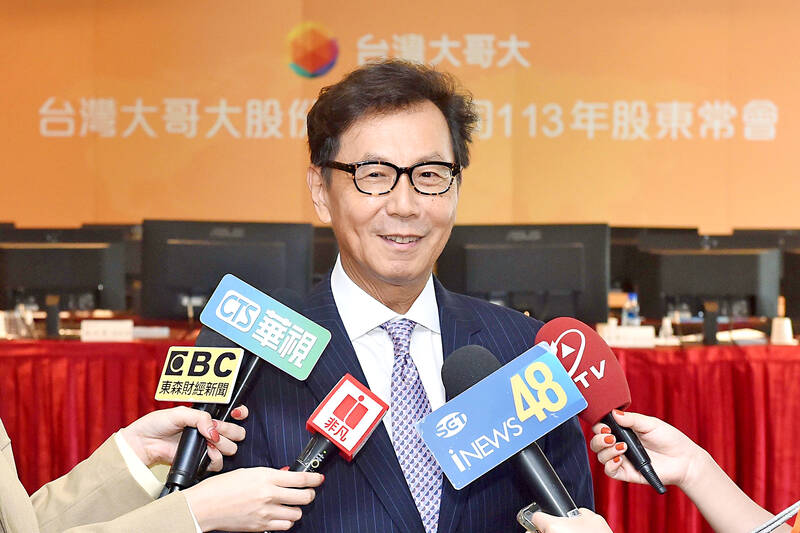Taiwan Mobile Co (台灣大哥大) yesterday said it aims to reclaim the title of the nation’s most profitable telecom within three to five years, leveraging its subscriber base and artificial intelligence (AI) technology to drive growth.
Taiwan Mobile chairman Daniel Tsai (蔡明忠) made the remarks in response to a shareholder’s question during the annual general meeting about when the company would beat Chunghwa Telecom Co (中華電信) again and regain its position as the top profit earner.
“It will be an uphill challenge. We are at a disadvantage when it comes to competing with a major rival like Chunghwa Telecom, as it dominates the fixed broadband market, which is a fast-rising market,” Tsai said.

Photo courtesy of Taiwan Mobile Co
It would be easy for Chunghwa Telecom to boost its average revenue per user and earnings per share (EPS), Tsai said.
Taiwan Mobile suffered a setback in telecom revenue and earnings over the past few years, he said.
Strong revenue stream from Momo.com Inc (富邦媒體) has helped support consolidated revenue, but the e-commerce subsidiary’s profit margin was slim, he said.
In 2012, Taiwan Mobile outstripped Chunghwa Telecom and became the nation’s most profitable telecom for the first time. It maintained that top position until 2020 when it lost ground to Chunghwa Telecom.
“We have seen the initial synergy from the acquisition of Taiwan Star Corp (台灣之星) in the first quarter,” Tsai said. “We hope to make further progress in the future. We hope to return to the position of the most profitable [telecom] company in the next three to five years in terms of EPS.”
Upon the completion of the merger on Dec. 1 last year, Taiwan Mobile’s subscriber base expanded to 10 million people. Revenue rose 6 percent year-on-year to NT$183.3 billion (US$5.66 billion) last year, while net profit rose 4 percent annually to NT$12.3 billion, or EPS of NT$4.33, the best in four years.
Taiwan Mobile aims to accelerate the profit growth by integrating information and communications technology as well as AI technology to its services to address the “AI anxiety” faced by local businesses, Tsai said.
The company would endeavor to shake off the perception of it as a “dumb pipe” provider, he said.
In other news, Far EasTone Telecommunications Co (遠傳電信) yesterday said it has adopted AI technology, generative AI technology in particular, to bolster its customer services, and optimize its offerings of digital content and online shopping.
Over the past few years, the company has generated about NT$10 billion in revenue by offering big data, AI and Internet-of-things (IoT) services, company president Chee Ching (井琪) told shareholders at its annual general meeting.
Far EasTone has more than 600 information technology engineers with AI expertise, a rapid increase from about 60 in 2018, it said.
Far EasTone is also looking overseas to fuel growth, given a smaller-scale home market, company chairman Douglas Hsu (徐旭東) said.
Nextlink Technology Co (博弘雲端), a cloud service provider 70 percent owned by Far EasTone, has expanded its business reach to Hong Kong and Southeast Asia, Ching said.
Additionally, Far EasTone plans to export its non-telecom services, such as remote healthcare and carbon emissions management services, to Japan and other regions, duplicating its success at home, she said.
Far EasTone expanded its number of mobile users to 9.08 million as of end of last quarter, after absorbing Asia Pacific Telecom Co (亞太電信) in December last year.

NEW IDENTITY: Known for its software, India has expanded into hardware, with its semiconductor industry growing from US$38bn in 2023 to US$45bn to US$50bn India on Saturday inaugurated its first semiconductor assembly and test facility, a milestone in the government’s push to reduce dependence on foreign chipmakers and stake a claim in a sector dominated by China. Indian Prime Minister Narendra Modi opened US firm Micron Technology Inc’s semiconductor assembly, test and packaging unit in his home state of Gujarat, hailing the “dawn of a new era” for India’s technology ambitions. “When young Indians look back in the future, they will see this decade as the turning point in our tech future,” Modi told the event, which was broadcast on his YouTube channel. The plant would convert

‘SEISMIC SHIFT’: The researcher forecast there would be about 1.1 billion mobile shipments this year, down from 1.26 billion the prior year and erasing years of gains The global smartphone market is expected to contract 12.9 percent this year due to the unprecedented memorychip shortage, marking “a crisis like no other,” researcher International Data Corp (IDC) said. The new forecast, a dramatic revision down from earlier estimates, gives the latest accounting of the ongoing memory crunch that is affecting every corner of the electronics industry. The demand for advanced memory to power artificial intelligence (AI) tasks has drained global supply until well into next year and jeopardizes the business model of many smartphone makers. IDC forecast about 1.1 billion mobile shipments this year, down from 1.26 billion the prior

People stand in a Pokemon store in Tokyo on Thursday. One of the world highest-grossing franchises is celebrated its 30th anniversary yesterday.

Zimbabwe’s ban on raw lithium exports is forcing Chinese miners to rethink their strategy, speeding up plans to process the metal locally instead of shipping it to China’s vast rechargeable battery industry. The country is Africa’s largest lithium producer and has one of the world’s largest reserves, according to the US Geological Survey (USGS). Zimbabwe already banned the export of lithium ore in 2022 and last year announced it would halt exports of lithium concentrates from January next year. However, on Wednesday it imposed the ban with immediate effect, leaving unclear what the lithium mining sector would do in the